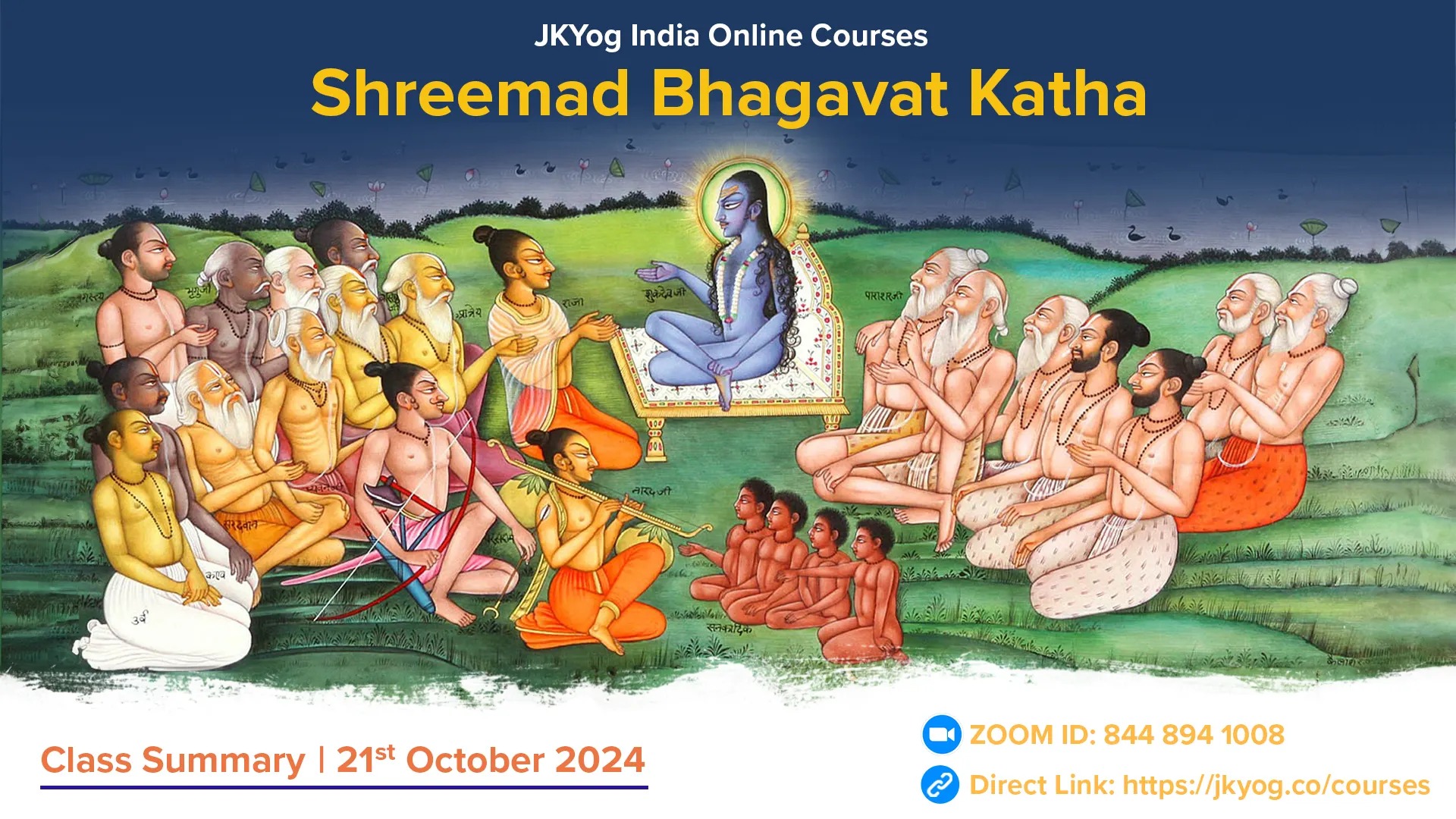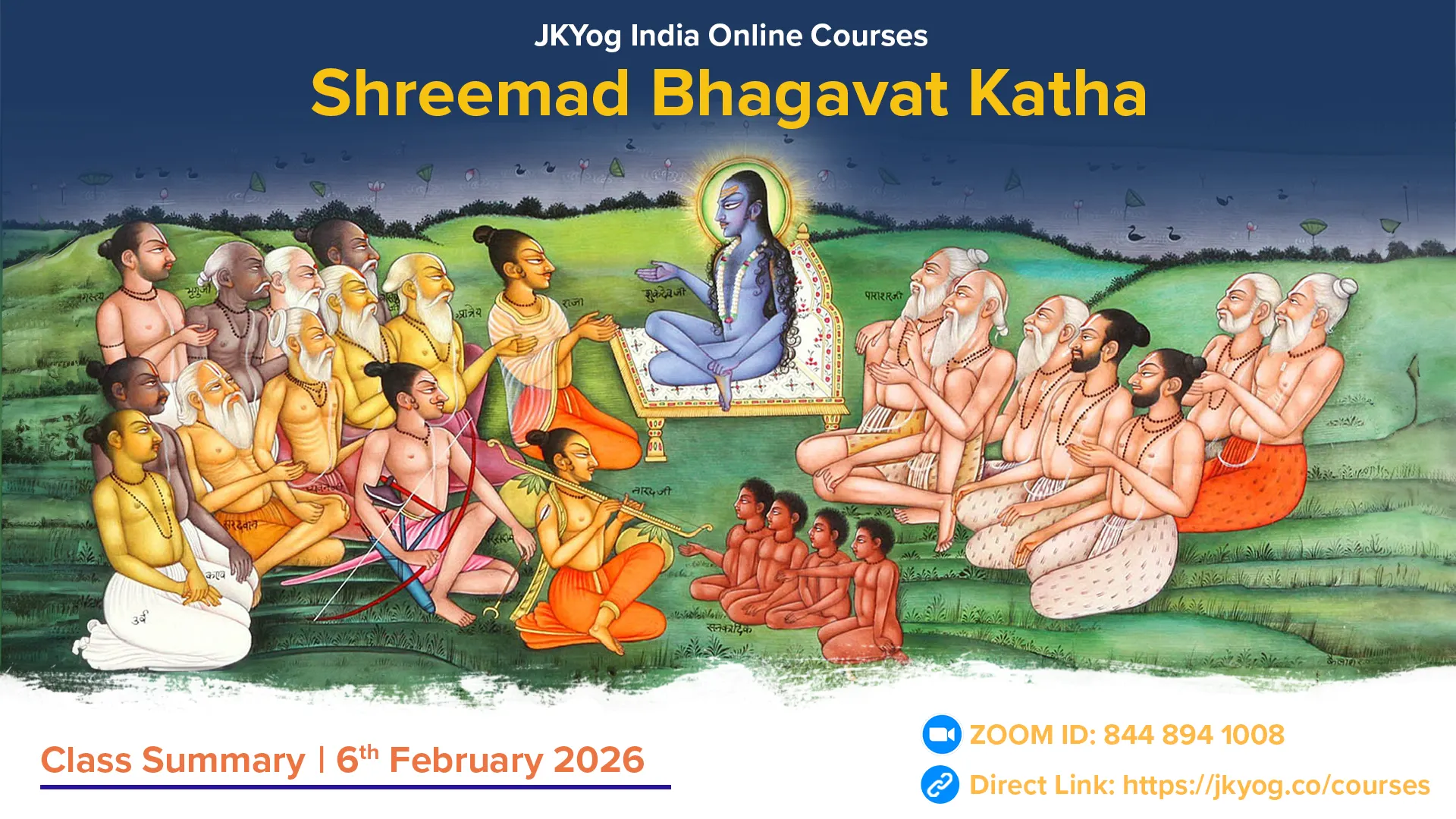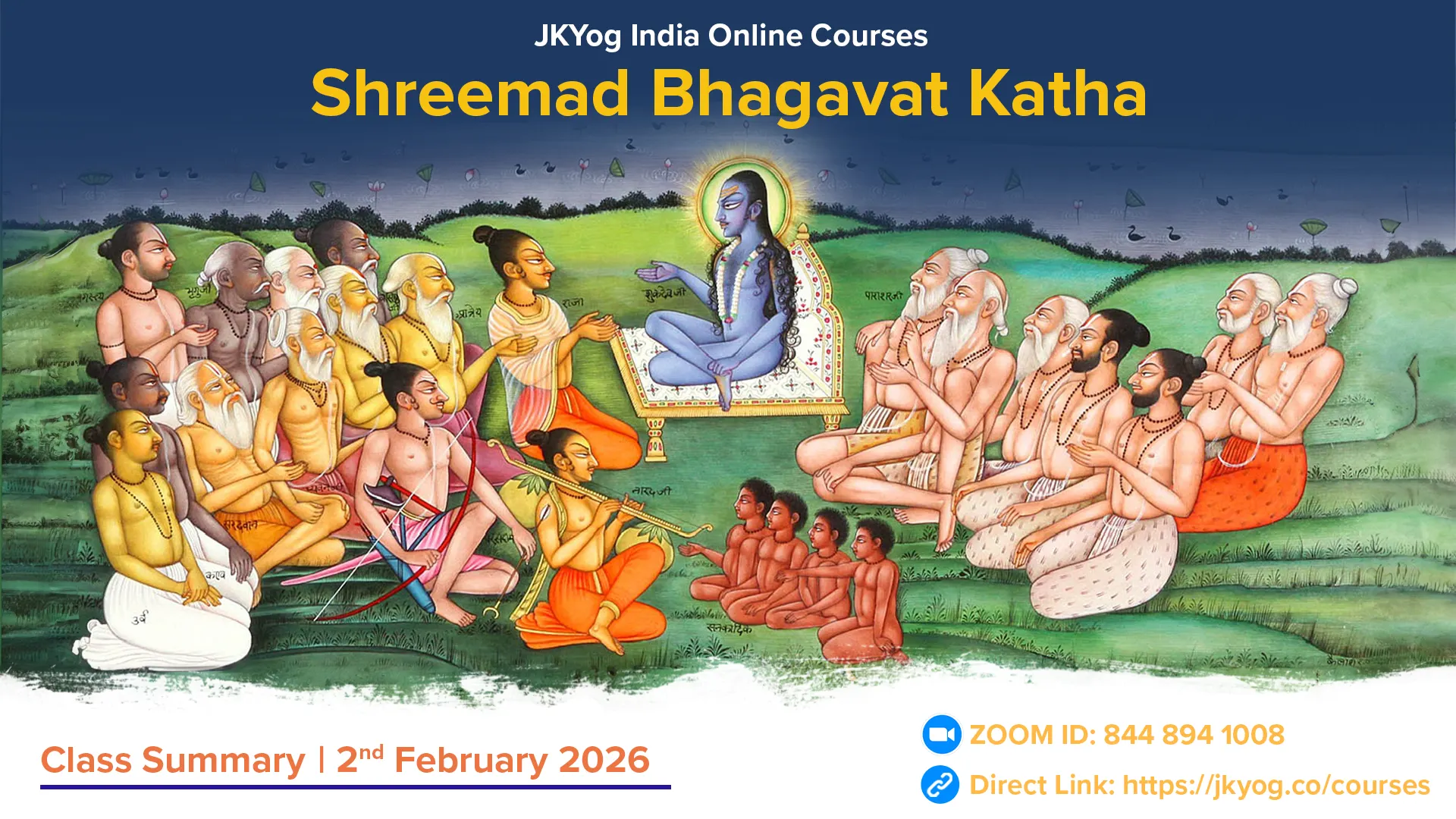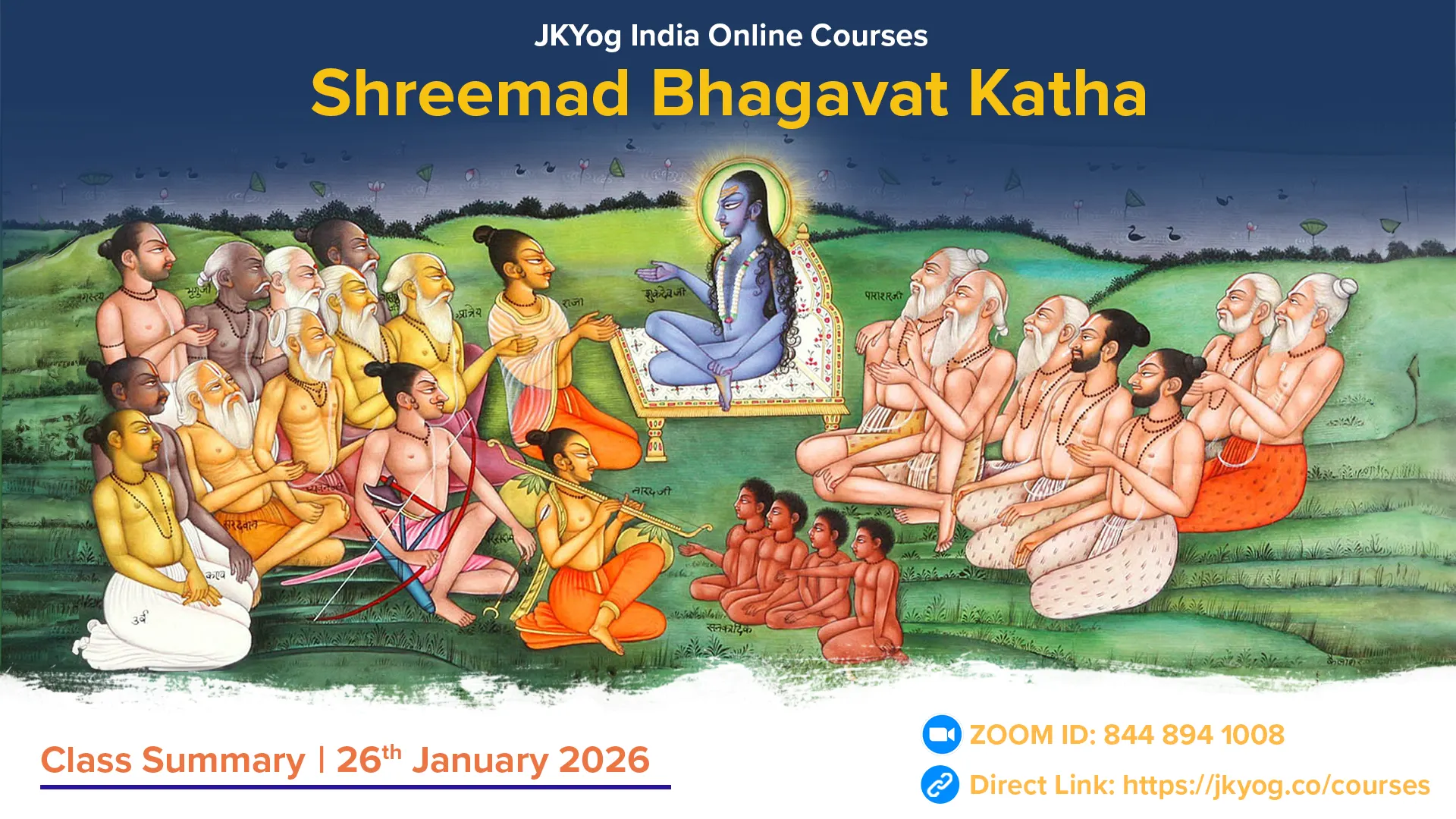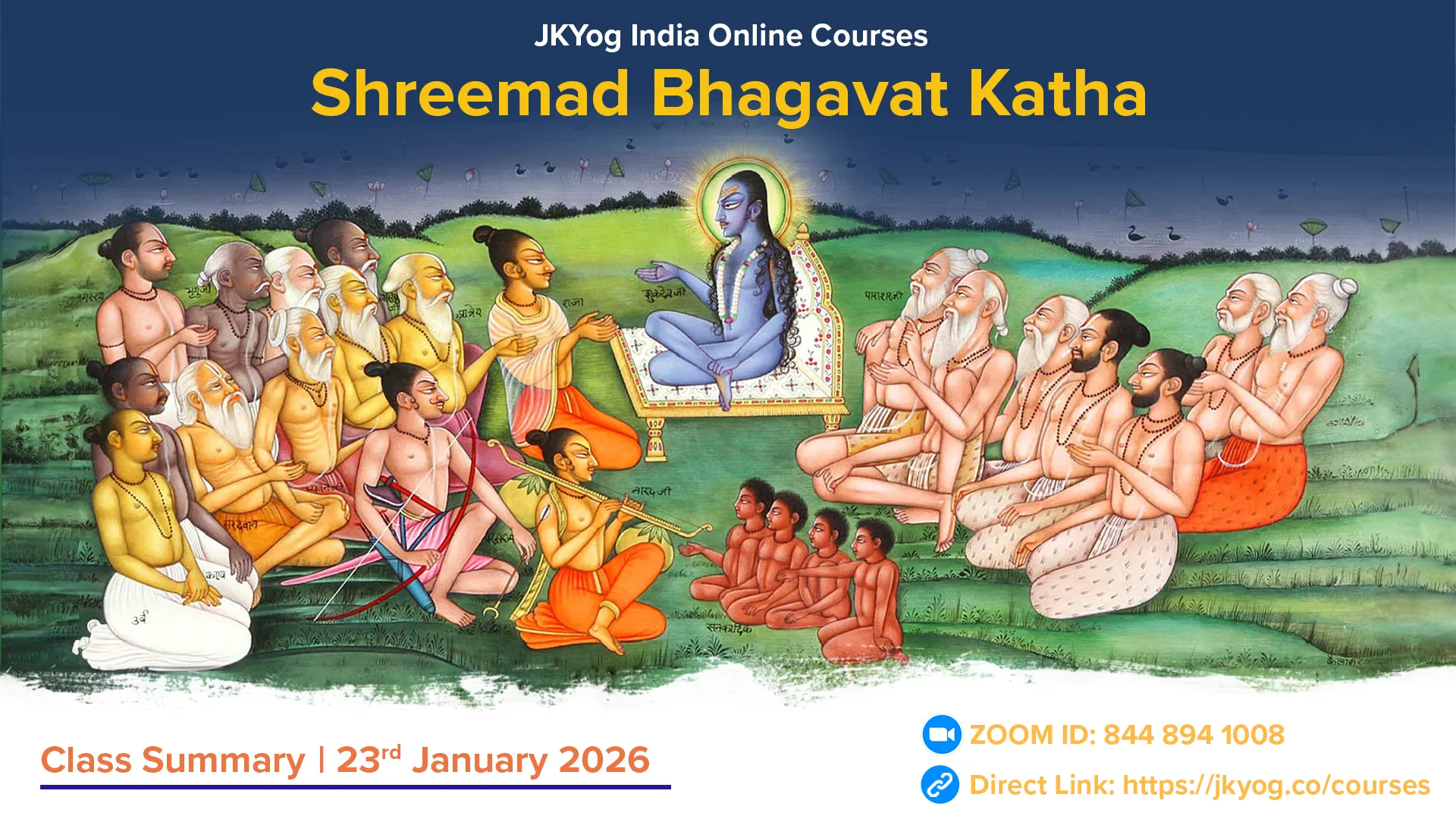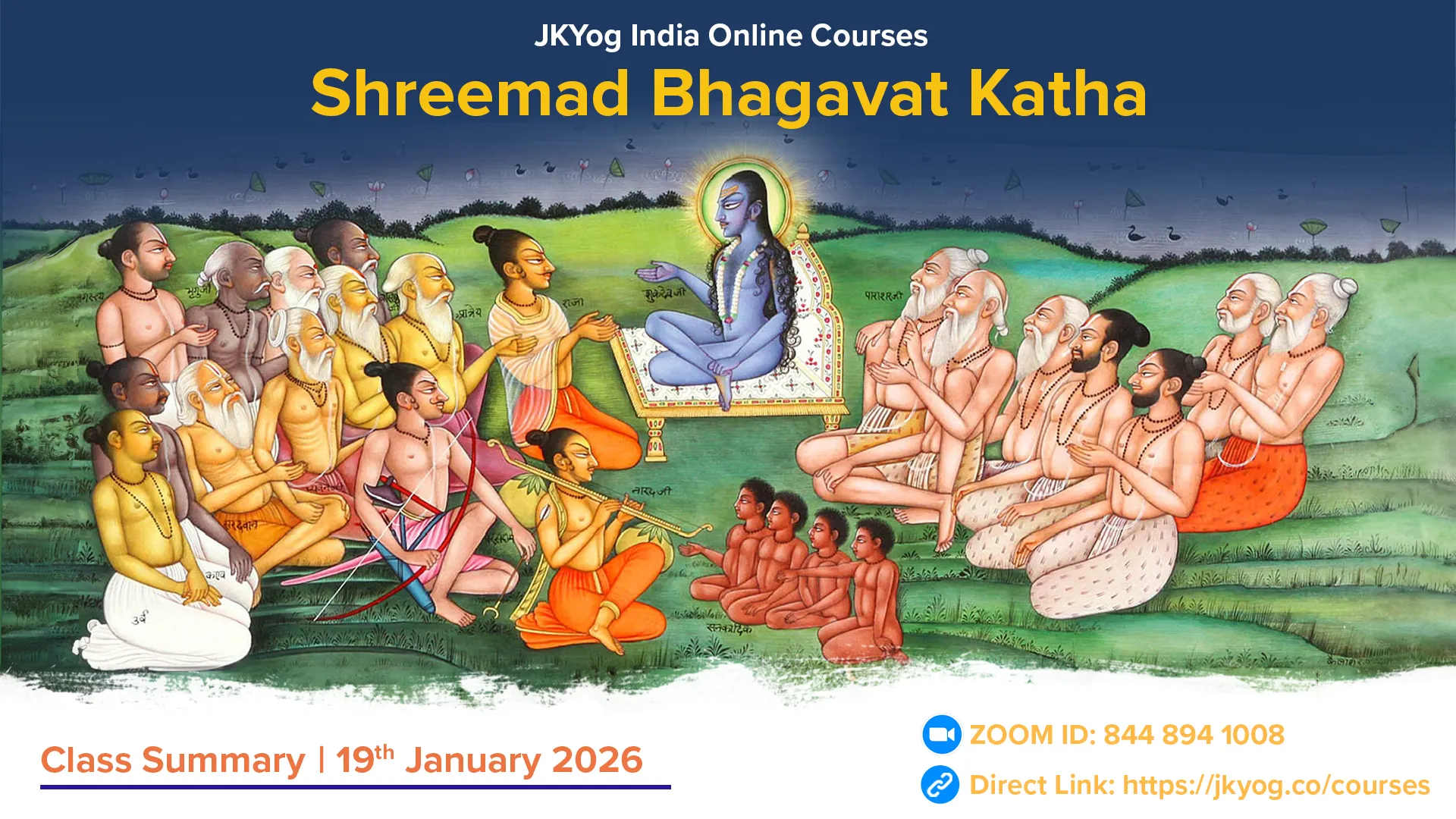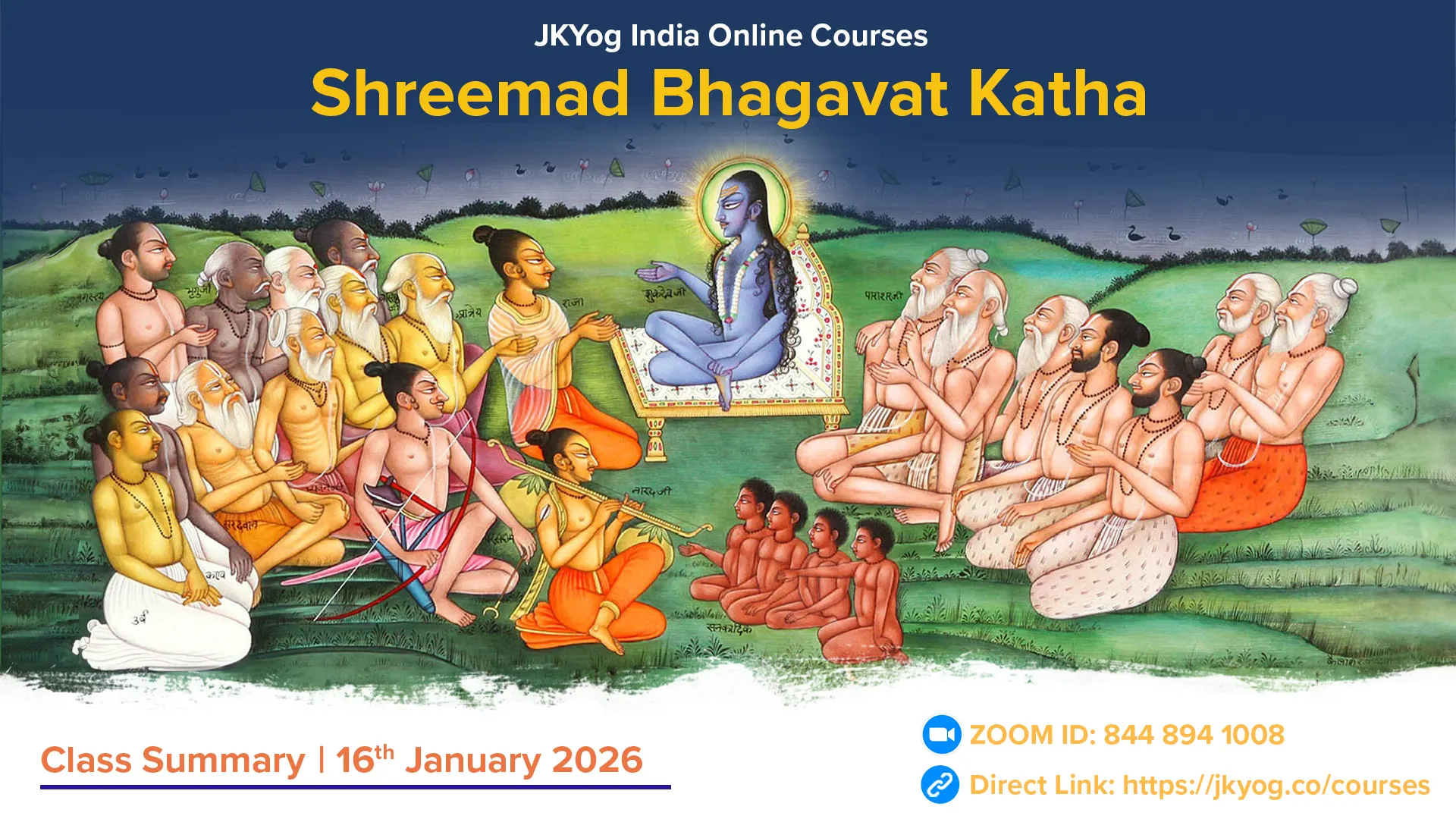Shreemad Bhagavat Mahapuran- Canto: 4, Chapters: 5 to 7
When Mahadev hears from Devarshi Narad that Devi Sati gave up Her life after being insulted by Her father, Daksha and that the Ribhus, who appeared from the sacrificial fire, drove away and killed His attendants' army, He becomes extremely enraged. In fury, biting His lips, He takes on a fierce form and pulls out one of His dreadlocks, which glows like lightning and fire. Then, He suddenly stands and throws that lock onto the ground with a loud, deep, terrifying laugh. Instantly, from it emerges a massive and towering man. His body is so enormous that it touches the heavens. He has a thousand arms, his complexion is as dark as a storm cloud, and his three blazing eyes shine like the Sun. His terrifying fangs are visible, and his red hair resembles flames of fire. Around his neck is a garland of skulls, and in his hands are various weapons.
When this giant man folds his hands and asks, "Bhagwan, what should I do?" Bhagwan Bhootnath says, "O Veerbhadra, you are a part of Me, so lead My attendants and immediately go destroy Daksha and his sacrifice."
As soon as Bhagwan Shankar gives this command in anger, Veerbhadra circumambulates Him and prepares to leave. He feels that no one in the world can match his speed, and he is capable of facing even the mightiest warrior. With a terrifying roar, he charges toward Daksha’s yajna mandap, holding a dreadful trident. His trident is so powerful that it could even destroy death itself. Several of Bhagwan Rudra’s attendants follow him, roaring alongside him. At that moment, the anklets and ornaments on Veerbhadra’s feet jingle and ring loudly as he marches forward.
Meanwhile, in the yajnashala, the priests, yajman (hosts), members, and other brahmins and brahmin wives notice dust rising in the northern direction and begin to wonder, “What is this darkness approaching? Where is this dust coming from?” There is no storm blowing, and there have been no reports of robbers. It's not even time for the cows to return yet. So, where did this dust come from? Could it be that the end of the world is near?"
At this moment, Daksha’s wife, Prasuti, and the other women, frightened, say, “Prajapati Daksha had insulted poor, innocent Sati in front of all his daughters. It seems this is the result of that sin. Or perhaps this is the consequence of disrespecting Bhagwan Rudra. When the time of destruction approaches, Bhagwan Rudra spreads His matted locks and stretches out His arms, preparing to perform the tandav dance. At that time, even the elephants of the directions get injured by the strikes of His trident, and His terrifying, thunderous laughter causes the directions to crack. His aura becomes so unbearable that He appears extremely dangerous due to His furrowed brows, and the constellations are thrown into disarray by His fearsome fangs. Can anyone, even Brahmaji himself, ever find peace if they repeatedly anger Bhagwan Shankar? Surely not.”
In Daksha's yajnashala, the people sitting there looked at each other with fear in their eyes, whispering all kinds of worried thoughts. Suddenly, terrifying sounds started echoing from all directions—both from the sky and the earth. At that very moment, Rudra's attendants rushed in and surrounded the yajna mandap from all sides. They were armed with various weapons, and some were short, some had grey or yellow complexions, and some had bellies and mouths resembling crocodiles. They began to wreak havoc in the yajnashala—some broke the pillars, others smashed the yajna vessels. Some extinguished the sacred fires, some urinated in the yajna kund, and others frightened the sages and women present there.
Veerbhadra captured Daksha, while the rest of the attendants seized the rishis and devas. Terrified by the dreadful actions of Bhagwan Shankar’s attendants, all the rishis and devas present there fled. Bhriguji, who was conducting the yajna, had his beard and moustache ripped off by Veerbhadra, as he had mocked Mahadevji during the Prajapatis’ assembly. Veerbhadra, enraged, then threw Bhagdevta to the ground and gouged out his eyes, as Bhagdevta had provoked Daksha when he cursed Mahadevji. After that, Veerbhadra knocked out Pusha’s teeth because Pusha had laughed, baring his teeth, when Daksha insulted Mahadevji.
Veerbhadra then sat on Daksha’s chest and attempted to sever his head with a sword, but despite his best efforts, he couldn’t separate the head from the body. When no weapon could pierce Daksha’s skin, Veerbhadra was perplexed and began to ponder. Finally, following the same method used to sacrifice animals in the yajna, Veerbhadra severed Daksha’s head from his body. Witnessing this, the bhut, pret, and pishach praised Veerbhadra, but Daksha’s supporters were devastated and cried out in sorrow.
In extreme fury, Veerbhadra threw Daksha’s head into the sacrificial fire, set the yajnashala ablaze, and destroyed the yajna. After accomplishing this, he returned to Kailash Parvat.
When Rudra's attendants defeated all the devas and their entire bodies were wounded and torn apart by the tridents, spears, swords, maces, iron clubs, and other weapons wielded by the bhut, pret, and other servants, the terrified devas, along with the priests and members of the yajna, went to Brahmaji. After bowing to him, they narrated the entire incident.
Bhagwan Brahmaji and the all-knowing Shree Narayan already knew that there would be turmoil at Daksha’s yajna, which is why they had not attended. After listening to the devas recount the events, Brahmaji said, “Devas, by not giving Bhagwan Shankar His rightful share in the yajna, you have committed a grave offence. His heart was already hurt by the insulting words of Daksha, and now He has also lost Sati. If you wish for the yajna to resume and be completed, go immediately and beg for His forgiveness. If He remains angry, it will be impossible for any of the worlds or their protectors to survive. Bhagwan Rudra is supremely independent, and neither I, nor any sage or rishi, nor the devas, fully understand His power and nature—let alone anyone else. So who could possibly find a way to calm Him?"
After advising the devas in this manner, Brahmaji, along with the Prajapatis and the ancestors (Pitr), set out from His abode toward Kailash.
How does Mount Kailash look?
On Mount Kailash, gods who have attained spiritual perfection, along with kinnar, gandharva, and apsara, reside permanently. This mountain sparkles with precious gems and metals, and it is home to a wide variety of trees and plants,where wild animals roam freely. Crystal-clear waterfalls flow down its slopes, and the mountain resonates with the melodious calls of birds, the cries of peacocks, and the gushing sounds of the streams. Various types of trees, creepers, and fragrant flowers further enhance its beauty. The ponds are adorned with blooming lotuses, and the chirping of birds adds to the serenity of the landscape. Deer, monkeys, lions, and other wild animals wander around freely.
The sacred Nanda River flows around the mountain, made even more holy by Sati’s bath. The stunning beauty of Kailash astonishes even the devas. The devas also saw a magnificent city called Alka, filled with the fragrance of divine lotuses. The two sacred rivers, Nanda and Alaknanda, flowed there, sanctified further by the touch of Shree Hari’s feet. Alkapuri, decorated with silver, gold, and gem-studded palaces, was home to the wives of the yakshas. The city appeared like a sky enveloped in lightning and clouds.
As the devas passed through the capital of Yaksharaj Kuber, they entered the divine Saugandhika forest, where the beautiful Kalpavriksha trees, the chirping of birds, and the fragrant breeze captivated the hearts of the yaksha women. The forest also had lotus-filled ponds with steps made of vaidoorya-mani (lapis lazuli).
As the devas proceeded further, they encountered a colossal banyan tree, towering a hundred yojanas high and spreading across seventy-five yojanas. Its vast shadow ensured that no sunlight ever touched the ground beneath it. Under this massive tree, the devas beheld Bhagwan Shankar seated, radiating the essence of Kaal itself. Bhagwan Bhootnath's (Shankar’s) form was serene and profoundly tranquil. Around Him were the perfected beings like Sanak and Sanandan, along with Yaksha-Rakshas ruler Kuber, all engaged in His service.
Mahadev is the well-wisher of all living beings, motivated by His love for all, and dedicated to the welfare of the worlds. He constantly practices meditation, concentration, and samadhi for the benefit of the cosmos. His body shone like the clouds at dusk, and He bore the marks of an ascetic, with His body adorned with sacred ash, a staff, matted locks, a deerskin, and the crescent moon on His head. He was seated on a grass mat (kushasana), teaching the eternal Brahman to Naradji, who had posed a question.
Mahadev's left foot rested on His right knee, and His left hand lay on His knee, holding a rudraksha mala. He sat in a gesture of logical discourse (tarka mudra), experiencing the bliss of Brahman. Upon seeing the contemplative Bhagwan Shankar, the sages and the protectors of the worlds (lokpals) bowed down to Him in reverence. Immediately, Bhagwan Shankar, upon noticing Brahmaji, rose to His feet and humbly bowed to Him with His head lowered in respect.
Then Brahmaji addresses Mahadev, saying, "You are the master of the entire universe and the Supreme Brahman. As the embodiment of Shiv-Shakti, you create, sustain, and dissolve the cosmos. Dharma and Artha are attained through your will, and the establishment of yajna is also by your command. The Varna-Ashrama system is your gift, and the Brahmins who follow it observe Dharma with deep faith and devotion. You grant heaven and moksha to those who perform virtuous deeds, while those who commit sinful acts are cast into hell by you.
Those who surrender at your feet and view all beings with an equal eye become free from anger and hatred. However, those who discriminate and try to demean others are filled with ignorance. Please show mercy on those who, out of ignorance, commit offenses, as they are already suffering at the hands of destiny. The priests of Daksha's yajna, out of ignorance, failed to offer you your rightful share in the yajna, which is why the sacrifice was destroyed."
Brahmaji then pleads to Mahadev, "Please, out of your compassion, restore the yajna. Bring Daksha back to life, restore Bhagdevata's eyes, Bhriguji's beard and moustache, and Pusha's teeth. Heal the wounds of the devas and rishis. Whatever remains after the yajna will be your share, and with your grace, this yajna will be completed successfully."
Hearing Brahmaji's prayer, Bhagwan Shankar smiled and said, "Prajapati! I neither dwell on the offences of the ignorant like Daksha nor do I hold grudges. The punishment I gave him was merely to warn him. Now that his head has been burned let him have the head of a goat. Bhagdevata will see his share of the yajna through the eyes of Mitradevata. Pusha will eat ground grain with the teeth of the yajman, and the limbs of the other devas will heal. The yajaks (priests) whose arms were broken will function with the arms of the Ashwini Kumars, and Bhriguji shall have a beard and moustache like a goat."
After this, Bhagwan Shankar accompanied Brahmaji and the other devas to the yajna site. As instructed, Daksha's head was replaced with the head of a sacrificial animal. The moment Bhagwan Shiv cast His divine gaze upon Daksha, he came back to life as though waking from sleep. When Daksha saw Bhagwan Shankar standing before him, the shadow of resentment against Him dissolved from his heart, and his mind was purified. Daksha wished to offer praise to Mahadev, but remembering his daughter Sati, his heart filled with affection and sorrow, leaving him speechless. Overwhelmed with love, Daksha managed to gather his emotions and began offering sincere prayers to Bhagwan Shiva.
Daksha said, "Bhagwan! I wronged You, but You taught me a lesson with mercy, bestowing immense grace upon me. Neither You nor Shree Hari ever disregard even those Brahmins who are Brahmins in name only and lack proper conduct. How could You forget a yajna-performer like me? O Lord! As Brahma, You first created Brahmins who follow knowledge, penance and vows to preserve the essence of the soul. Just as a shepherd protects cows with a stick, You safeguard the Brahmins from all calamities.
After seeking forgiveness from Bhagwan Shiva, Daksha, upon Brahmaji's instruction, commenced the yajna once again.The Brahmins offered purodasha (a type of sacrificial food) to please Bhagwan Vishnu. As soon as Daksha focused his mind on Bhagwan Vishnu, He appeared there.
All the devas, Gandharvas, and rishis sang the praises of Bhagwan Vishnu and prayed for His grace. Bhagwan Shree Hari, who partakes in the share of all, addressed Daksha with a pleased demeanour.
Aham Brahma cha Sharva cha Jagataha karanam param
Atmeshwar upadrashhta swayam drigvisheshanah
Shree Hari said, "I am the supreme cause of the universe, both Brahma and Mahadev; I am the soul, the God, and the witness of all. I am self-luminous and free from all attributes." (Bhagavat 4.7.50)
Atmamaya samavishya soham gunamai dvija
Srijan rakshan haran vishwam dadhre sanjnaam kriyochitam
“Vipravar! Accepting My three gunas (qualities), I continuously create, sustain, and destroy the universe. It is I who have assumed the names Brahma, Vishnu, and Shankar in accordance with those actions." (Bhagavat 4.7.51)
Tasmim brahmanyadvitiye kevale paramatmani
Brahmarudrau cha bhutani bhedena ajno'nupashyati
"I am that undivided, pure form of Parabrahman. It is in Me that the ignorant person sees Brahma, Rudra, and all other beings in various forms." (Bhagavat 4.7.52)
Yatha pumaan na swangeshu shirah-paani aadishu kvachit
Parakya-buddhim kurute evam bhooteshu mat-paraha
"Just as a person never considers their own head, hands, and other limbs as separate from themselves, similarly, My devotee does not see any living being as separate from Me." (Bhagavat 4.7.53)
Trayaanam ekabhavaanam yo na pashyati vai bhidaam
Sarva-bhoota-atmanaam brahman sa shaantim adhi-gachchhati
"Brahman! We, Brahma, Vishnu, and Maheshwar, are all one in essence, and We are the complete embodiment of all living beings. Therefore, the one who sees no distinction in Us attains peace." (Bhagavat 4.7.54)
Daksha completed the yajna. All the gods blessed Daksha Prajapati, saying, "May your intellect always remain in dharma," and then they ascended to the heavenly realm.
Maitreyaji tells Vidurji that Daksha's daughter Sati took birth again from the womb of the Himalayan queen Mainadevi, and just as the divine energy merges with Bhagwan at the time of pralaya (dissolution), Shree Ambikaji also chose her beloved Bhagwan Shankar in that birth.
Maitreyaji continues to say to Vidurji that Brahmaji's steadfast celibate sons, like Sanakadi, Narad, Ribhus, Hans, Aruni, and Yati, did not lead a householder's life, and therefore they had no offspring. Adharma, who was the son of Brahmaji, had a wife named Mrisha. Their son was named Dambha, and their daughter was named Maya. Nirriti (the personification of death, decay, and suffering) took them away because she had no progeny. From Dambha and Maya, Lobh (greed) and Nikriti (deceit) were born, which in turn gave rise to Krodha (anger), Hinsa (violence), Kali (conflict), and Durukti (harsh words). From Durukti, Kali and Mrityu (death) were born, leading to suffering and hell.
Thus, I have briefly described the lineage of Adharma, which is the cause of pralaya. By renouncing this Adharma, one can accumulate virtue; hence, by listening to this description three times, a person can cleanse the impurities of their mind.
Summary: JKYog India Online Class- Shreemad Bhagavat Katha [Hindi]- 21.10.2024

